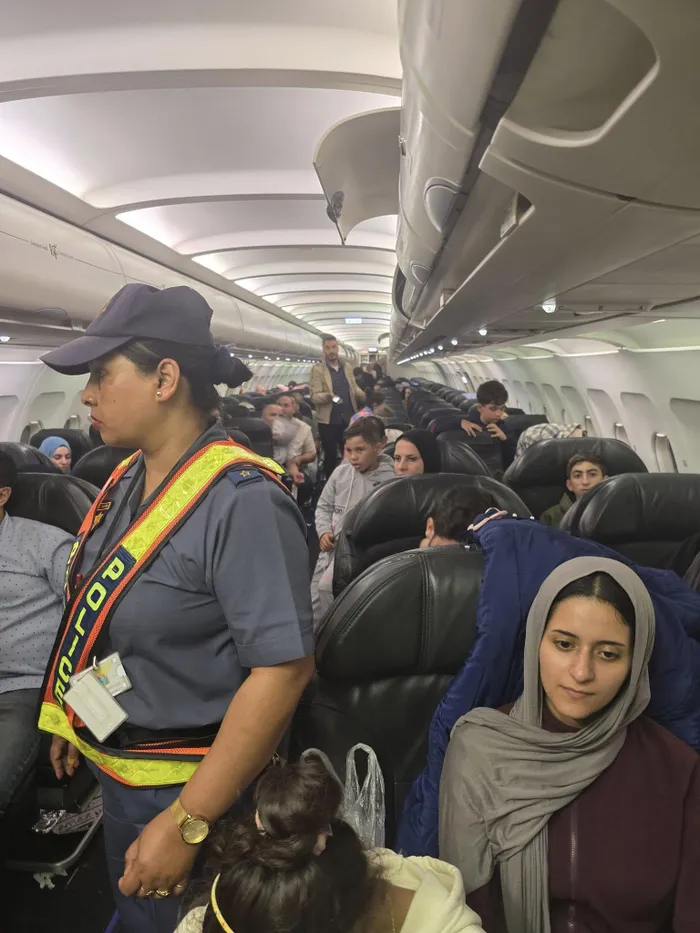Human trafficking fears surround arrival of Palestinian refugees in South Africa

Organisations say Palestinian families who arrived in South Africa last week could have been trafficked.
Image: Facebook/Embassy of the State of Palestine / South Africa
The arrival of Palestinian families in South Africa has been linked to human trafficking following the revelation that the organisation that handled the departure is unregistered and facilitated the travel irregularly and irresponsibly.
On Thursday, a group of 153 Palestinian refugees arrived in South Africa on a chartered flight from Kenya to seek asylum in the country, although they were initially denied entry due to a lack of proper documentation.
The refugees waited for nearly 12 hours at the OR Tambo International Airport in Johannesburg to be cleared or turned away.
They were granted entry into the country under a standard 90-day visa exemption and were admitted on humanitarian grounds.
The Embassy of Palestine in South Africa said the organisation, Al-Majd Europe, that facilitated the departure is an unregistered organisation that deceived the families.
“The unregistered and misleading organisation deceived families, collected money from them, and facilitated their travel in an irregular and irresponsible manner. This entity later attempted to disown any responsibility once complications arose,” the embassy said, adding that the organisation exploited the tragic humanitarian conditions of “our people” in Gaza.
President Cyril Ramaphosa on Friday announced that the government was probing the arrival of the refugees.
However, both Ramaphosa’s spokesperson Vincent Magwenya and Chrispin Phiri, the spokesperson for the Department of International Relations and Cooperation (Dirco), did not respond to requests for comment.
Senior Researcher at the Mapungubwe Institute, Naeem Jennah, said although their legal representatives are still trying to make a determination, they of the view that this could amount to human trafficking.
“Our lawyers are looking at it right now to see whether it fulfills the definition of human trafficking. But it seems it was. Imagine a scenario where people in a desperate situation have to pay money and cross the border not knowing where they are going,” he said.
Jennah added that people were told that they were heading to Indonesia and Malaysia, but ended up in South Africa. He said by not providing traveling documentation, there is also no proof that the families left Gaza.
According to media repots, the German-based non-profit organisation, Al-Majd Europe was involved in facilitating the controversial travel.
Al-Majd Europe describes itself as a humanitarian organisation founded in Germany and based in East Jerusalem. However, investigations have found that it is actually registered in Estonia and operates through a front consulting company.
The organisation reportedly offered "evacuation" for a fee (ranging from approximately $1,400 to $2,000 per person) to various destinations, including South Africa, without the passengers knowing their final destination.
The refugees were reportedly moved from Rafah to the Israeli-controlled Karem Abu Salem crossing and then to Israel’s Ramon Airport, with the Israeli military appearing to facilitate the transfer.
Jennah said this was suspicious.
Sarah Oosthuizen, a volunteer at Gift of the Givers, said this is suspicious and sound like human trafficking, adding that the investigations will reveal everything.
“To me, the argument might be that they paid for something but they did not get what they have paid for. They were not taken where they though they were going. I am not sure how you define human trafficking but this sounds suspicious,” she said, adding that this should be thoroughly investigated.
Oosthuizen said the investigation should also reveal who is behind this and what is the intention of such persons.
Professor Andre Thomashausen, Professor Emeritus of International Law at Unisa, said to facilitate unauthorised border crossings constitutes human trafficking, which is forbidden under national and international laws.
Thomashausen said this is why airlines are obliged to take back a passenger who arrives at a destination without a valid entry permit, a visa.
“To guard against this risk, airlines check that passengers have valid travel documents and proof of being entitled to enter the destination country. It appears that this was not done in the case of the departure of the Palestinian passengers in question and the issue is further complicated by the alleged fact that the original flight destination was not South Africa.”
“But to enter South African airspace the plane had to have an approved flight plan and a foreign operator permit to be allowed to land. Such flight plan and landing permission should not have been granted without submission of a passenger list with the required proof that the passengers would be entitled to enter South Africa, be it as refugees or as tourists,” he said.
Thomashausen, however, added that relevant question is not what Israel authorities did or should have done but rather, who in South Africa was delinquent in approving the flight plan and granting landing permission and who filed those requests on behalf of an unknown charter flight operator.
“So the issue is one of yet another breakdown of internal South African border management and airspace control. Third countries, namely the States of Palestine or Israel do not owe South Africa a duty to enforce South African visa and entry regulations,” he said.
Law expert Richard Spoor echoed these sentiments, adding that the government should tell the country who from South Africa, assisted in facilitating this.
manyane.manyane@inl.co.za